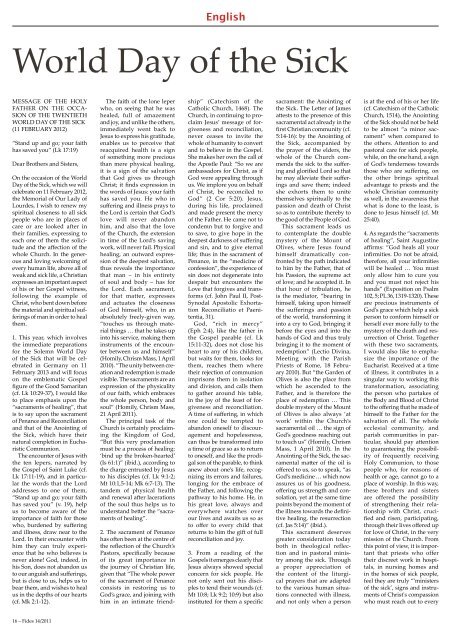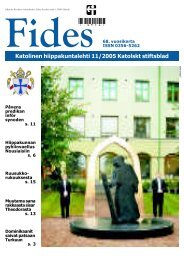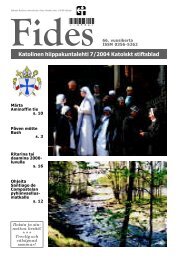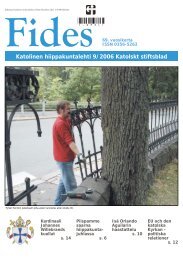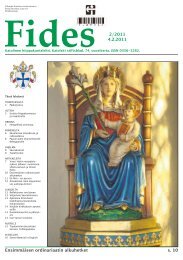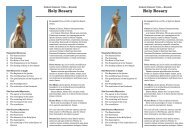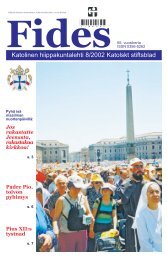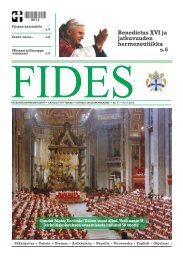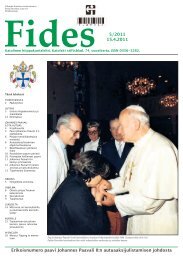Artikkeleita - Katolinen kirkko Suomessa
Artikkeleita - Katolinen kirkko Suomessa
Artikkeleita - Katolinen kirkko Suomessa
You also want an ePaper? Increase the reach of your titles
YUMPU automatically turns print PDFs into web optimized ePapers that Google loves.
MeSSAge oF THe Holy<br />
FATHeR oN THe oCCA-<br />
SIoN oF THe TWeNTIeTH<br />
WoRlD DAy oF THe SICK<br />
(11 FeBRUARy 2012)<br />
“Stand up and go; your faith<br />
has saved you” (lk 17:19)<br />
Dear Brothers and Sisters,<br />
on the occasion of the World<br />
Day of the Sick, which we will<br />
celebrate on 11 February 2012,<br />
the Memorial of our lady of<br />
lourdes, I wish to renew my<br />
spiritual closeness to all sick<br />
people who are in places of<br />
care or are looked after in<br />
their families, expressing to<br />
each one of them the solicitude<br />
and the affection of the<br />
whole Church. In the generous<br />
and loving welcoming of<br />
every human life, above all of<br />
weak and sick life, a Christian<br />
expresses an important aspect<br />
of his or her gospel witness,<br />
following the example of<br />
Christ, who bent down before<br />
the material and spiritual sufferings<br />
of man in order to heal<br />
them.<br />
1. This year, which involves<br />
the immediate preparations<br />
for the Solemn World Day<br />
of the Sick that will be celebrated<br />
in germany on 11<br />
February 2013 and will focus<br />
on the emblematic gospel<br />
figure of the good Samaritan<br />
(cf. lk 10:2937), I would like<br />
to place emphasis upon the<br />
“sacraments of healing”, that<br />
is to say upon the sacrament<br />
of Penance and Reconciliation<br />
and that of the Anointing of<br />
the Sick, which have their<br />
natural completion in eucharistic<br />
Communion.<br />
The encounter of Jesus with<br />
the ten lepers, narrated by<br />
the gospel of Saint luke (cf.<br />
lk 17:1119), and in particular<br />
the words that the lord<br />
addresses to one of them,<br />
“Stand up and go; your faith<br />
has saved you” (v. 19), help<br />
us to become aware of the<br />
importance of faith for those<br />
who, burdened by suffering<br />
and illness, draw near to the<br />
lord. In their encounter with<br />
him they can truly experience<br />
that he who believes is<br />
never alone! god, indeed, in<br />
his Son, does not abandon us<br />
to our anguish and sufferings,<br />
but is close to us, helps us to<br />
bear them, and wishes to heal<br />
us in the depths of our hearts<br />
(cf. Mk 2:112).<br />
16 – Fides 14/2011<br />
The faith of the lone leper<br />
who, on seeing that he was<br />
healed, full of amazement<br />
and joy, and unlike the others,<br />
immediately went back to<br />
Jesus to express his gratitude,<br />
enables us to perceive that<br />
reacquired health is a sign<br />
of something more precious<br />
than mere physical healing,<br />
it is a sign of the salvation<br />
that god gives us through<br />
Christ; it finds expression in<br />
the words of Jesus: your faith<br />
has saved you. He who in<br />
suffering and illness prays to<br />
the lord is certain that god’s<br />
love will never abandon<br />
him, and also that the love<br />
of the Church, the extension<br />
in time of the lord’s saving<br />
work, will never fail. Physical<br />
healing, an outward expression<br />
of the deepest salvation,<br />
thus reveals the importance<br />
that man – in his entirety<br />
of soul and body – has for<br />
the lord. each sacrament,<br />
for that matter, expresses<br />
and actuates the closeness<br />
of god himself, who, in an<br />
absolutely freelygiven way,<br />
“touches us through material<br />
things … that he takes up<br />
into his service, making them<br />
instruments of the encounter<br />
between us and himself”<br />
(Homily, Chrism Mass, 1 April<br />
2010). “The unity between creation<br />
and redemption is made<br />
visible. The sacraments are an<br />
expression of the physicality<br />
of our faith, which embraces<br />
the whole person, body and<br />
soul” (Homily, Chrism Mass,<br />
21 April 2011).<br />
The principal task of the<br />
Church is certainly proclaiming<br />
the Kingdom of god,<br />
“But this very proclamation<br />
must be a process of healing:<br />
‘bind up the brokenhearted’<br />
(Is 61:1)” (ibid.), according to<br />
the charge entrusted by Jesus<br />
to his disciples (cf. lk 9:12;<br />
Mt 10:1,514; Mk 6:713). The<br />
tandem of physical health<br />
and renewal after lacerations<br />
of the soul thus helps us to<br />
understand better the “sacraments<br />
of healing”.<br />
2. The sacrament of Penance<br />
has often been at the centre of<br />
the reflection of the Church’s<br />
Pastors, specifically because<br />
of its great importance in<br />
the journey of Christian life,<br />
given that “The whole power<br />
of the sacrament of Penance<br />
consists in restoring us to<br />
god’s grace, and joining with<br />
him in an intimate friend-<br />
English<br />
World Day of the Sick<br />
ship” (Catechism of the<br />
Catholic Church, 1468). The<br />
Church, in continuing to proclaim<br />
Jesus’ message of forgiveness<br />
and reconciliation,<br />
never ceases to invite the<br />
whole of humanity to convert<br />
and to believe in the gospel.<br />
She makes her own the call of<br />
the Apostle Paul: “So we are<br />
ambassadors for Christ, as if<br />
god were appealing through<br />
us. We implore you on behalf<br />
of Christ, be reconciled to<br />
god” (2 Cor 5:20). Jesus,<br />
during his life, proclaimed<br />
and made present the mercy<br />
of the Father. He came not to<br />
condemn but to forgive and<br />
to save, to give hope in the<br />
deepest darkness of suffering<br />
and sin, and to give eternal<br />
life; thus in the sacrament of<br />
Penance, in the “medicine of<br />
confession”, the experience of<br />
sin does not degenerate into<br />
despair but encounters the<br />
love that forgives and transforms<br />
(cf. John Paul II, Post<br />
Synodal Apostolic exhortation<br />
Reconciliatio et Paenitentia,<br />
31).<br />
god, “rich in mercy”<br />
(eph 2:4), like the father in<br />
the gospel parable (cf. lk<br />
15:1132), does not close his<br />
heart to any of his children,<br />
but waits for them, looks for<br />
them, reaches them where<br />
their rejection of communion<br />
imprisons them in isolation<br />
and division, and calls them<br />
to gather around his table,<br />
in the joy of the feast of forgiveness<br />
and reconciliation.<br />
A time of suffering, in which<br />
one could be tempted to<br />
abandon oneself to discouragement<br />
and hopelessness,<br />
can thus be transformed into<br />
a time of grace so as to return<br />
to oneself, and like the prodigal<br />
son of the parable, to think<br />
anew about one’s life, recognizing<br />
its errors and failures,<br />
longing for the embrace of<br />
the Father, and following the<br />
pathway to his home. He, in<br />
his great love, always and<br />
everywhere watches over<br />
our lives and awaits us so as<br />
to offer to every child that<br />
returns to him the gift of full<br />
reconciliation and joy.<br />
3. From a reading of the<br />
gospels it emerges clearly that<br />
Jesus always showed special<br />
concern for sick people. He<br />
not only sent out his disciples<br />
to tend their wounds (cf.<br />
Mt 10:8; lk 9:2; 10:9) but also<br />
instituted for them a specific<br />
sacrament: the Anointing of<br />
the Sick. The letter of James<br />
attests to the presence of this<br />
sacramental act already in the<br />
first Christian community (cf.<br />
5:1416): by the Anointing of<br />
the Sick, accompanied by<br />
the prayer of the elders, the<br />
whole of the Church commends<br />
the sick to the suffering<br />
and glorified lord so that<br />
he may alleviate their sufferings<br />
and save them; indeed<br />
she exhorts them to unite<br />
themselves spiritually to the<br />
passion and death of Christ<br />
so as to contribute thereby to<br />
the good of the People of god.<br />
This sacrament leads us<br />
to contemplate the double<br />
mystery of the Mount of<br />
olives, where Jesus found<br />
himself dramatically confronted<br />
by the path indicated<br />
to him by the Father, that of<br />
his Passion, the supreme act<br />
of love; and he accepted it. In<br />
that hour of tribulation, he<br />
is the mediator, “bearing in<br />
himself, taking upon himself<br />
the sufferings and passion<br />
of the world, transforming it<br />
into a cry to god, bringing it<br />
before the eyes and into the<br />
hands of god and thus truly<br />
bringing it to the moment of<br />
redemption” (lectio Divina,<br />
Meeting with the Parish<br />
Priests of Rome, 18 February<br />
2010). But “the garden of<br />
olives is also the place from<br />
which he ascended to the<br />
Father, and is therefore the<br />
place of redemption … This<br />
double mystery of the Mount<br />
of olives is also always ‘at<br />
work’ within the Church’s<br />
sacramental oil … the sign of<br />
god’s goodness reaching out<br />
to touch us” (Homily, Chrism<br />
Mass, 1 April 2010). In the<br />
Anointing of the Sick, the sacramental<br />
matter of the oil is<br />
offered to us, so to speak, “as<br />
god’s medicine … which now<br />
assures us of his goodness,<br />
offering us strength and consolation,<br />
yet at the same time<br />
points beyond the moment of<br />
the illness towards the definitive<br />
healing, the resurrection<br />
(cf. Jas 5:14)” (ibid.).<br />
This sacrament deserves<br />
greater consideration today<br />
both in theological reflection<br />
and in pastoral ministry<br />
among the sick. Through<br />
a proper appreciation of<br />
the content of the liturgical<br />
prayers that are adapted<br />
to the various human situations<br />
connected with illness,<br />
and not only when a person<br />
is at the end of his or her life<br />
(cf. Catechism of the Catholic<br />
Church, 1514), the Anointing<br />
of the Sick should not be held<br />
to be almost “a minor sacrament”<br />
when compared to<br />
the others. Attention to and<br />
pastoral care for sick people,<br />
while, on the one hand, a sign<br />
of god’s tenderness towards<br />
those who are suffering, on<br />
the other brings spiritual<br />
advantage to priests and the<br />
whole Christian community<br />
as well, in the awareness that<br />
what is done to the least, is<br />
done to Jesus himself (cf. Mt<br />
25:40).<br />
4. As regards the “sacraments<br />
of healing”, Saint Augustine<br />
affirms: “god heals all your<br />
infirmities. Do not be afraid,<br />
therefore, all your infirmities<br />
will be healed … you must<br />
only allow him to cure you<br />
and you must not reject his<br />
hands” (exposition on Psalm<br />
102, 5; Pl 36, 13191320). These<br />
are precious instruments of<br />
god’s grace which help a sick<br />
person to conform himself or<br />
herself ever more fully to the<br />
mystery of the death and resurrection<br />
of Christ. Together<br />
with these two sacraments,<br />
I would also like to emphasize<br />
the importance of the<br />
eucharist. Received at a time<br />
of illness, it contributes in a<br />
singular way to working this<br />
transformation, associating<br />
the person who partakes of<br />
the Body and Blood of Christ<br />
to the offering that he made of<br />
himself to the Father for the<br />
salvation of all. The whole<br />
ecclesial community, and<br />
parish communities in particular,<br />
should pay attention<br />
to guaranteeing the possibility<br />
of frequently receiving<br />
Holy Communion, to those<br />
people who, for reasons of<br />
health or age, cannot go to a<br />
place of worship. In this way,<br />
these brothers and sisters<br />
are offered the possibility<br />
of strengthening their relationship<br />
with Christ, crucified<br />
and risen, participating,<br />
through their lives offered up<br />
for love of Christ, in the very<br />
mission of the Church. From<br />
this point of view, it is important<br />
that priests who offer<br />
their discreet work in hospitals,<br />
in nursing homes and<br />
in the homes of sick people,<br />
feel they are truly “’ministers<br />
of the sick’, signs and instruments<br />
of Christ's compassion<br />
who must reach out to every


